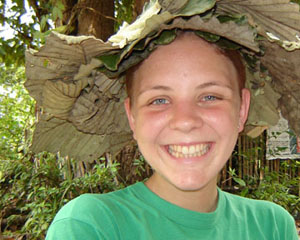

Venture Boldly

Office of Communications
2 East South Street
Galesburg, IL 61401

 When Knox College student Mary Batterman '07 applied to Knox's Study Abroad program in her junior year, she had an image of what community development in Khon Kaen, Thailand might be like. "I knew I would spend part of my time living with two local families," she said. Although she lived in a dormitory three nights a week, the majority of Batterman's time was spent living with two families that made a living selling recyclables. A typical work day for each family was very different.
When Knox College student Mary Batterman '07 applied to Knox's Study Abroad program in her junior year, she had an image of what community development in Khon Kaen, Thailand might be like. "I knew I would spend part of my time living with two local families," she said. Although she lived in a dormitory three nights a week, the majority of Batterman's time was spent living with two families that made a living selling recyclables. A typical work day for each family was very different.
The other family that Batterman lived with worked a more traditional timetable. This community consists of 100,000 people whose families have illegally occupied government land for more than 40 years. Every day they ride through the streets of the community looking for recyclables along roadsides. "These families make their living gathering recyclables they sell to a junk shop, who in turn sells them to a recycling company," Batterman says.
A different classroom
Waste is collected daily in Thailand. Treading through knee-deep heaps of trash and armed with a pitchfork in one hand and a bucket in the other, Batterman and the others sort through the miles of garbage. To a bystander, this is a landfill, but to these communities, this is their backyard and the pungent odor is the smell of money.
Batterman's honor's project examines the potential implications for policies that would help improve the lives of scavengers in Thailand. "Both families earned between $5 and $15 per person per day," she says. "That is near the average income for anyone in the community. In reality these families are making a viable income by scavenging. It really surprised me how both families had big screen televisions and a lot of modern luxuries. The family that lived near the landfill had one of the nicest homes in their community and even qualified for a loan."
Once Batterman returned from her studies abroad, she says she knew she wanted to go back. She applied for and received funding from Richter and the Caterpillar Foundation as well as Knox College. "The project was mostly anthropology in nature. These families depend on money they collect from scavenged recycling materials to support their livelihood. I wanted to examine the socio and economic development."
The families earned their livelihood digging through the dirt of the community, but on the surface they were like everyone else. Their children attend school. And although one family did elicit the help of their young daughters, once the girls reached a certain age, they did not allow them scavenge. "They wanted to shelter them from ridicule and low self-esteem. The parents worked on building the girls' confidence. I thought that was worth studying," she says.
In addition to rifling through trash, Batterman interviewed countless families, scribbled a lot of field notes about the communities and recorded more than 14 hours of video. "Scavenging provides employment and a livelihood for impoverished individuals in high unemployment communities and those with a poor education or physical handicap," Batterman says. "These scavenging communities are an important part of the economy. Not everyone is willing to do this job, and they keep the junk shops and the recycling companies in business."
A heap of possibilities
"I am working on the narrative of my film now," she says. "Once I complete my honor's project, I want to show the film to a wider audience." Batterman says that she is considering submitting the film in a student competition.
Growing up in a family that traveled a lot, Batterman says that she has never had a problem communicating with people. "My father was a social studies teacher, so in the summer, we traveled to Ecuador, South Africa, and a lot of places. I always made friends?language was never a barrier," she says.
As she grew up, Batterman thought she would become a teacher. Now, she is exploring plans that hopefully will take her overseas. "I eventually would like to work for the United Nations or as a socio economic developer or non-government organization," she says.
During her four years at Knox College, Batterman has been involved in Student Senate and some of its committees. "Before I came here, I knew I wanted a liberal arts school, but I didn't know what I wanted to do, didn't have a major in mind." Selecting a broad range of classes led Batterman to her interest in cultural anthropology. "I really love Knox," she says. "Knox has supported everything I wanted to do."
Mary Batterman wearing a leaf hat made by her host mother in Thailand
Published on May 14, 2007